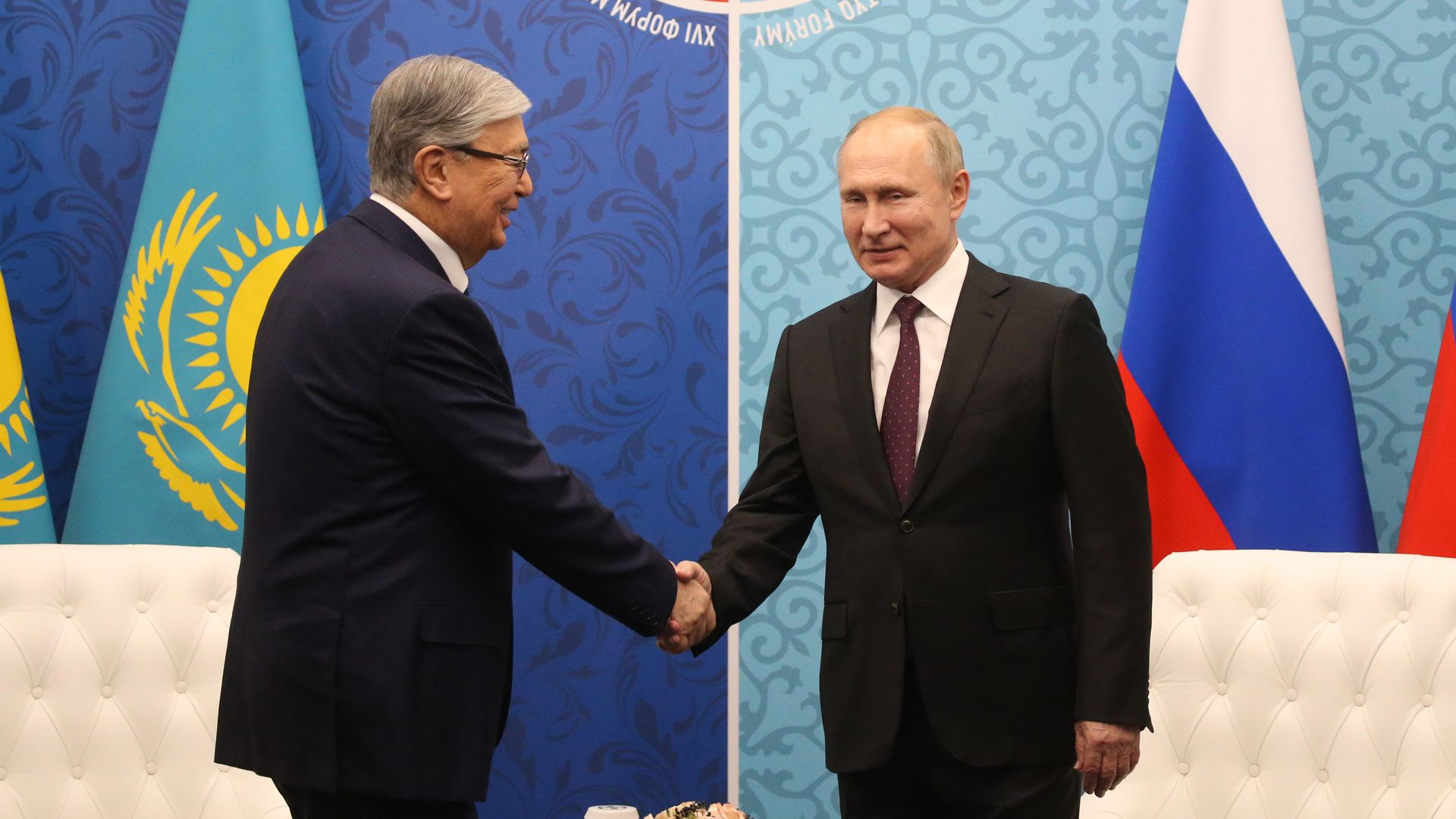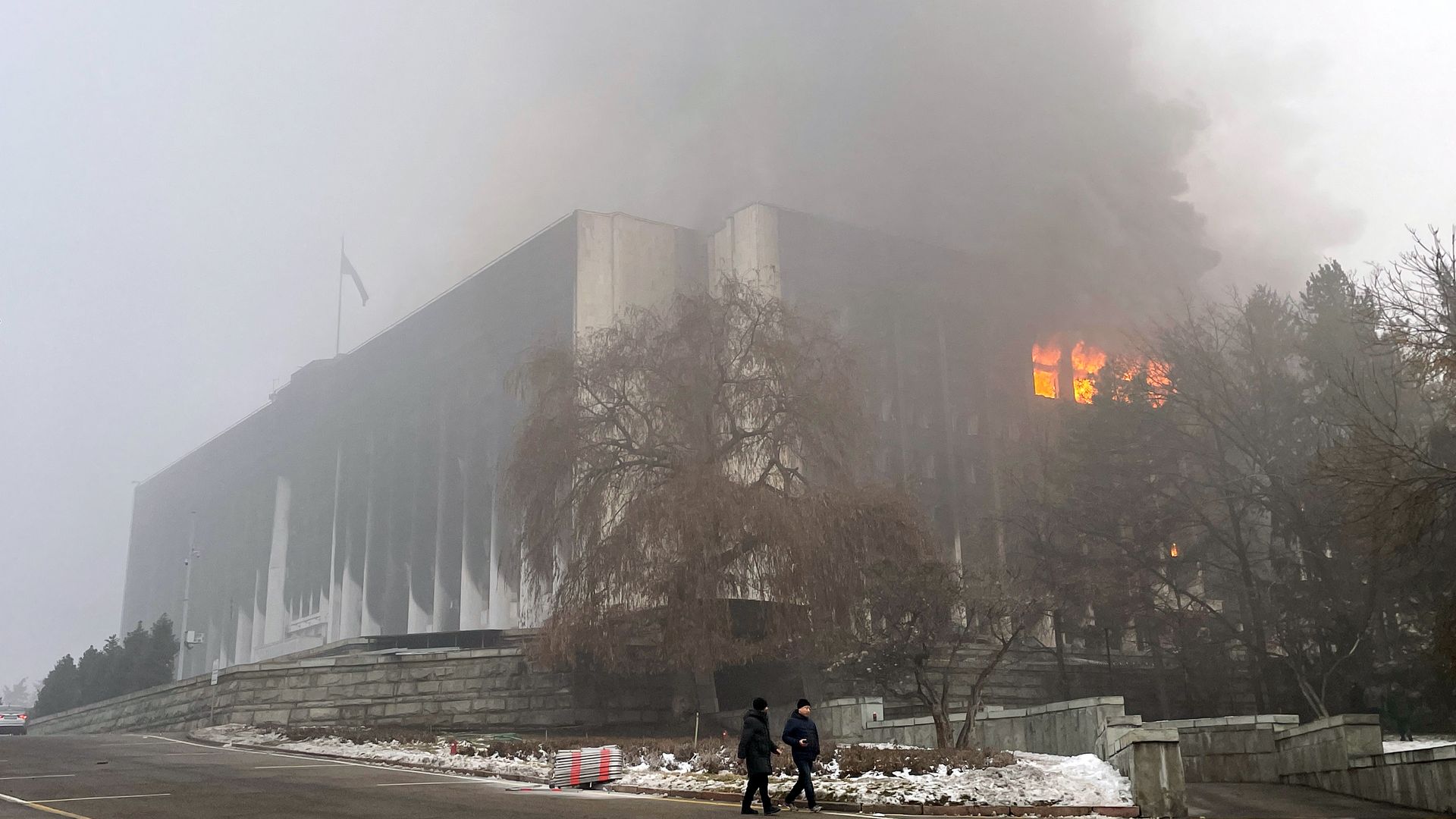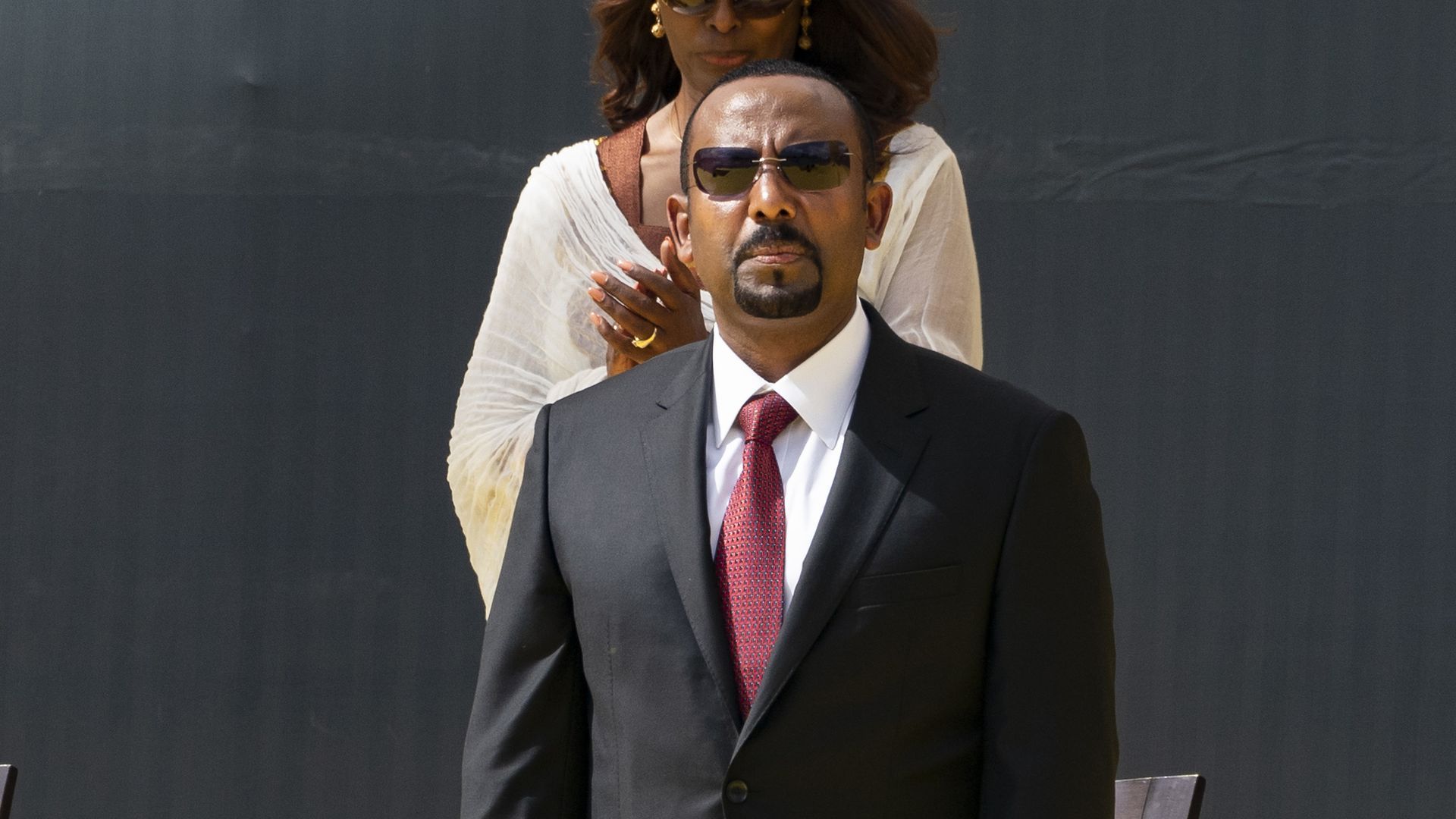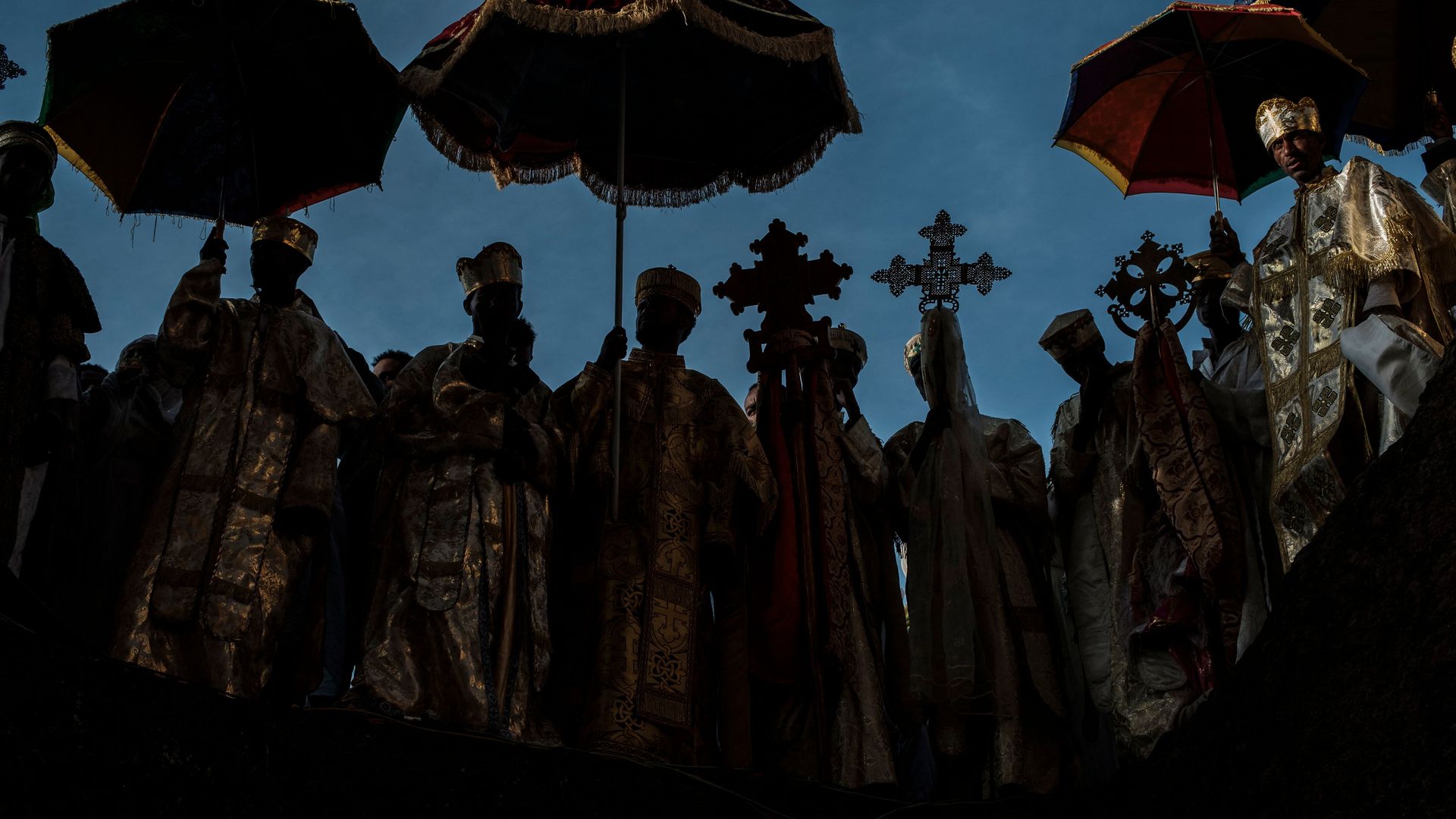| | | | | | | | | | | Axios World | | By Dave Lawler ·Jan 10, 2022 | | Welcome back to Axios World. - Tonight's edition (1,772 words, 6½ minutes) has a whole lot of Russia, Kazakhstan and Ukraine, with later stops in Ethiopia, Mali and the Olympic Village.
New arrival? Subscribe. | | | | | | 1 big thing: Putin's two-pronged push on Russia's sphere of influence |  | | | Vladimir Putin with Kassym-Jomart Tokayev (on left) in November. Photo: Mikhail Svetlov/Getty | | | | Today was a day of red lines for Vladimir Putin: Russia will not allow "color revolutions" in its neighborhood, he said, and will stand by its demands that NATO pull back from its borders and keep Ukraine out, even as Washington insists those are "non-starters." Driving the news: Putin said at a virtual gathering of leaders of the Collective Security Treaty Organization (CSTO), that by dispatching troops to Kazakhstan, the Moscow-led alliance had shown it "will not allow the situation to be rocked at home and will not allow so-called 'color revolutions,'" a reference to the uprisings that toppled pro-Moscow governments in Georgia and Ukraine. - Putin described the events in neighboring Kazakhstan as a foreign-backed terrorist operation, a claim for which there is little evidence. He said Russian troops would remain in Kazakhstan until order is restored and President Kassym-Jomart Tokayev deems them no longer necessary.
- By inviting Moscow in, Tokayev underscored Moscow's position as security guarantor for regimes in the region. He may also have compromised his country's sovereignty.
- Even if Russia doesn't leave troops in the country, "it's hard to imagine that Moscow wouldn't try to secure something in exchange for this activation," says Alexander Cooley, a Central Asia expert at Columbia University.
Meanwhile in Geneva, Russian Deputy Foreign Minister Sergei Ryabkov said that if diplomacy over Ukraine and NATO fails, Russia will opt for an unspecified "military-technical solution." - Those comments followed the first of three meetings Russia will hold this week with U.S. and European interlocutors who are hoping to stave off a potential invasion of Ukraine — something Ryabkov denied Russia was planning.
- But he also said the U.S. would be "playing with fire" if it didn't move quickly to reach legally binding pledges to reduce NATO's footprint in Eastern Europe and to keep Ukraine out.
- The deals must be cut on Russia's terms, he insisted: "It should be NATO that is making a step toward Russia rather than the other way around, so Russia shouldn't modify its position regarding key issues."
Between the lines: Top U.S. officials warn that the Russians may be using the talks as a pretext to invade Ukraine when their maximalist demands are inevitably rejected, Axios' Zach Basu reports.  Reproduced from The Wall Street Journal; Map: Axios Visuals Deputy Secretary of State Wendy Sherman told reporters following an eight-hour meeting with Ryabkov that the U.S. was open to discussing "reciprocal" restrictions on missiles and military exercises, but "will not allow anyone to slam closed NATO's open door policy." - She also confirmed publicly for the first time that the Biden administration's sanctions in response to a Russian invasion of Ukraine could include export controls on certain key technologies.
- Ryabkov denounced what he called U.S. "blackmail" on sanctions, saying the U.S. had failed to "learn anything from history, from the events of recent times."
- He also mocked Western diplomats, saying they knew how to threaten and to sanction but no longer knew how to make a deal. "That's ok," he added. "We will try to teach them."
What to watch: Next up are Russia-NATO talks on Wednesday. - Russian Foreign Minister Sergey Lavrov may have set the tone for those discussions when he said NATO's mission after the fall of the Soviet Union had been to take over geopolitical "orphans."
- That's hardly how countries like Poland, the Baltic states or, indeed, Ukraine would see it.
|     | | | | | | 2. Kazakhstan crisis I: Tokayev claims a coup |  | | | Kassym-Jomart Tokayev (center, at front) is inaugurated as president of Kazakhstan in 2019 as former dictator Nursultan Nazarbayev (top right) looks on. Photo: Pavel Aleksandrov/TASS via Getty | | | | Tokayev claimed today that unnamed actors had orchestrated an "attempted coup d'etat" against him and said he would soon provide evidence. What's happening: Authorities announced Saturday that powerful intelligence chief Karim Massimov — a close ally of former dictator Nursultan Nazarbayev — had been arrested on suspicion of treason. Nazarbayev has himself vanished from view after being ousted last Wednesday from his role as head of the security council. Flashback: Nazarbayev ruled Kazakhstan from independence in 1990 through 2019, when he handed the presidency to Tokayev but continued as security council chief and the apparent power behind the throne. Multiple members of Nazerbayev's family have become billionaires due to the family's control of much of the oil-rich country's economy. - The former president's spokesman on Saturday denied claims that the 81-year-old and his family had fled the country. Nazarbayev, the spokesman claimed, is in regular touch with Tokayev and continues to support him.
Breaking it down: The government acknowledges that spontaneous, peaceful protests over a spike in fuel prices began last weekend in Western Kazakhstan and spread from there. - Events took a turn last Tuesday night in Almaty, Kazakhstan's largest city, when mobs stormed public buildings and briefly took control of the international airport — apparently with little intervention from security forces.
- The next day, Tokayev fired the cabinet and security chiefs (including Nazarbayev), and took the extraordinary step of requesting CSTO troops.
- The government has blamed the violence on "local and international terrorist groups, speaking foreign languages" and showing a "high level of preparedness and coordination."
Another possible explanation: Akezhan Kazhegeldin, a former prime minister and now a de facto opposition-leader-in-exile, claims the Nazarbayev family, fearful that its hold on power and the economy was slipping, attempted to use the protests as cover for a coup to restore Nazarbayev as president and establish a member of the family as his successor. - Another exiled opposition figure, Serik Medetbekov, made similar claims in a separate interview with Axios. He contended that paramilitaries long under Nazarbayev's command were behind the street violence.
- Between the lines: The accounts were not based on direct knowledge and could not be verified. Kazhegeldin and Nazarbayev are also long-time political foes.
|     | | | | | | 3. Kazakhstan crisis II: Follow the money |  | | | The mayor's office burns in Almaty. Photo: Valery Sharifulin\TASS via Getty | | | | "I think we can be confident that there is a high-level elite struggle going on and some level of infighting," says Columbia University's Cooley. "I think we can also say with a high degree of confidence that there was a political reason why Tokayev turned to the CSTO and the Russians." - The most obvious reason, Cooley contends, would be to convince members of the security services who were wavering or potentially plotting against him that Moscow had his back.
- Tokayev's government has stopped referring to the Kazakh capital as "Nur-Sultan," the name it was given in 2019 to honor Nazarbayev. But the apparent transition in power and personnel underway there may not be easy to manage for a president who owes his power to Nazerbayev and up to now had been seen as the ultimate loyalist.
What to watch: If the current crisis ends with the Nazarbayevs out of power or potentially out of the country, the fight might not be over, Cooley notes. - "The family controls all of the strategic assets," Cooley says. "The sovereign wealth fund, the major banks, the oil and gas sector, some extractives in the uranium sector." Family members also hold hundreds of millions of dollars worth of real estate in London and have assets in the Gulf and elsewhere in Europe, he adds.
- That could set up an "internal struggle" in Kazakhstan over control of key assets and industries, as well as an "external struggle" in courts and western capitals for control of the overseas holdings, Cooley says.
|     | | | | | | A message from Axios | | The podcast to power your day. | | |  | | | | Every weekday morning, host Niala Boodhoo catches you up quick on the latest news and interesting stories you won't hear anywhere else. In 10 minutes, you'll hear the latest scoops, smart analysis, and insights into the trends shaping our world. Listen now for free. | | | | | | Bonus: Where in the World? | | Screengrab via Apple Maps We're keeping things simple tonight: Can you name the seven countries with names ending in "stan"? Scroll to bottom for answers. |     | | | | | | 4. State of the outbreak |  | | | High school students in Kampala. Photo: Badru Katumba/AFP via Getty Images | | | | 1. Uganda reopened its schools Monday, ending the world's longest coronavirus-related shutdown and ushering millions of students back to the classroom for the first time in almost two years, Axios' Yacob Reyes writes. - More than half of Uganda's students have received no education since schools closed, per the government's figures.
2. Novak Djokovic's Australian visa cancellation was overturned by a judge on Monday, and the Serbian tennis star will now be able to defend his Australian Open title barring another twist. - Djokovic was held in a detention center after the government determined that he should not have been granted a medical waiver to enter Australia without being vaccinated.
3. A 200-person birthday bash has become a major political scandal in Hong Kong amid public outrage that top officials attended despite warnings to avoid mass gatherings. Two cases have been linked to the party. 4. An analysis of excess mortality published in Science estimates that 3.2 million people in India died of COVID-19 between June 1, 2020, and July 1, 2021. That's 6.5 times the official death toll for the entirety of the pandemic. 5. Chile is rolling out a fourth shot, starting with immunocompromised people and then opening up to all adults. |     | | | | | | 5. Biden calls Ethiopia's Abiy after "constructive steps" |  | | | Ethiopian Prime Minister Abiy Ahmed. Photo: Jemal Countess/Getty Images | | | | Biden spoke with Ethiopian Prime Minister Abiy Ahmed on Monday at Biden's request to encourage recent "constructive steps," like the release of political prisoners, while also raising concerns about civilian casualties in the country's civil war, Axios' Ivana Saric reports. Why it matters: A recent government offensive seems to have tipped the scales of the fighting. A senior U.S. official told reporters Abiy was now showing more interest in dialogue. - "This could be a moment of opportunity, but only if the parties are willing to take advantage of it," a senior U.S. official told reporters.
- Yes, but: Biden also raised concerns about civilian casualties, including a government airstrike on Friday that reportedly killed 56 people in a displaced persons camp in Tigray.
Meanwhile in West Africa, the ECOWAS regional bloc announced that it would sever diplomatic ties with Mali and impose tough sanctions on the country, which has seen two military coups since 2020. |     | | | | | | 6. Smile to go: Sharing the Olympic dream |  | | | Erin Jackson (on left) and Brittany Bowe speak to the media Sunday. Photo: Stacy Revere/Getty Images | | | | With the Winter Olympics right around the corner, we end with this story from Axios' Kendall Baker: U.S. speedskater Brittany Bowe earned an Olympic spot on Sunday — then gave it to her teammate. - Erin Jackson was the No. 1-ranked skater in the 500 meters, but slipped during the last qualifier and finished third, missing the team by one place. Bowe finished first, but had already qualified in two other events.
- "I woke up and I was just giving it some thought and I didn't want to have this moment without Erin out there. So I called her late this morning and just told her that I wanted to officially give her her spot," Bowe said.
|     | | | | | | 7. Stories we're watching |  | | | Celebrating Orthodox Christmas in Ethiopia. Photo: Duardo Soteras/AFP via Getty | | | - Myanmar court sentences Suu Kyi to 4 more years in prison
- Vote on Nord Stream sanctions puts Democrats in a bind
- Sullivan seeks advice from Russia hawks
- Iran sanctions 50 Americans
- U.S. troops to stay on base in Japan due to Covid
- Cruise blues
- 7 hot years
Quoted: "Things turned violent very, very quickly." — 9 News Melbourne's Adam Hegarty reporting from a bizarre scene in which Novak Djokovic fans who had been celebrating today's ruling surrounded a car they thought he was in and were dispersed by pepper spray-wielding police. Strange world. |     | | | | | | A message from Axios | | The podcast to power your day. | | |  | | | | Every weekday morning, host Niala Boodhoo catches you up quick on the latest news and interesting stories you won't hear anywhere else. In 10 minutes, you'll hear the latest scoops, smart analysis, and insights into the trends shaping our world. Listen now for free. | | | | Answers: 1. Kazakhstan. 2. Uzbekistan. 3. Turkmenistan. 4. Afghanistan. 5. Pakistan. 6. Tajikistan. 7. Kyrgyzstan. |  | Bring the strength of Smart Brevity® to your team — more effective communications, powered by Axios HQ. | | | | | | Axios thanks our partners for supporting our newsletters. If you're interested in advertising, learn more here.
Sponsorship has no influence on editorial content. Axios, 3100 Clarendon Blvd, Suite 1300, Arlington VA 22201 | | | You received this email because you signed up for newsletters from Axios.
Change your preferences or unsubscribe here. | | | Was this email forwarded to you?
Sign up now to get Axios in your inbox. | | | | Follow Axios on social media:    | | | | | |
No comments:
Post a Comment